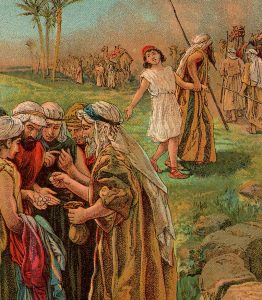WEEKDAY LENT 02 05 – Year II
Resisting Repentance
(Gen 37:3-28; Ps 105; Mt 21:33-46)
*******************************************
The poet, Robert Frost, wrote these memorable words: “Something there is that does not love a wall; that sends the groundswell under it.”
There is something in human nature that does not love goodness; that resists it and seeks to hurt and harm the other instead.
Today’s readings invite us to repent, to change, to let go of that innate resistance and experience the Good News.
 We see that innate evil in the brothers of Joseph – their jealousy and resentment of him to the degree that they want to first kill him, then because of the intervention of his brothers Reuben and Judah, end up only selling him into slavery.
We see that innate evil in the brothers of Joseph – their jealousy and resentment of him to the degree that they want to first kill him, then because of the intervention of his brothers Reuben and Judah, end up only selling him into slavery.
In the gospel, we see the resistance of the scribes and Pharisees to Jesus. He then exposes their guilt in a subtle way by telling a parable about the vineyard workers who resist handing over the fruit of the vineyard to the owner, and kill all the servants he sends, including his son.
Not only is this parable exposing the tendency in human nature towards evil; it is actually a prophetic sign of what would happen to Jesus, who himself was the Son sent by the owner of the vineyard, God. What an invitation to change, to repentance he was giving to the religious leaders. Their reaction – instead of repentance and change, they just wanted to arrest him. How stubborn they were.
How different it was with King David, which is almost an identical incident to this run-in Jesus has with the Pharisees. When the prophet Nathan told King David a parable about a rich man who stole a beloved lamb from a poor man for his banquet, and was asked what should be done about it – King David gave the right answer, just like the Pharisees and scribes in the gospel.
However, unlike them, when Nathan proclaims “You are the man,” and exposes David’s sin, David is struck to the heart, admits his sin, and repents sincerely. That experience of God’s unconditional love transforms him into the only true King that Israel ever had. It was almost like he had to sin in that way, to experience that kind of love, to qualify him to become a true King. That actually touches on the reason Julien of Norwich uses to explain why God allows sin – because it will in the end reveal how loving God is.
There seems to be a pattern here. During the passion of Jesus, it almost seems like Peter had to sin, to deny Jesus three times and then abandon him, to qualify him to become the first Pope. When Jesus looked at him, he repented, wept bitterly, and received the unconditional love and forgiveness of Jesus, both in the upper room with the rest of the disciples, and especially on the shore of Lake Tiberias, when Jesus specifically reminds him of his three denials, but asking him three times if he loved him. That was Peter’s transformation into the person who could now become the first leader of the Church.
Rather than think smugly how we would be different from the scribes and Pharisees, we could take a line from Pope Francis – who am I to judge? Who knows how we would have reacted given the same circumstances. Our best stance is to take a good hard look at our own behaviour, painful emotions and negative attitudes, be honest, admit them, and come to the Lord for both forgiveness and healing.
Then we can truly live out the Eucharist which is an experience of the unconditional love of Jesus for us, forgiving us and healing us, and readying us to be his Good News in the world.




Yes, I agree with the homilies and messages about resisting repentance. If we want to live out the Eucharist ; we need to learn to let go of every negative thoughts and endovers or sins that is burden inside us. Do we want to experience God’s unconditional love, mercy and forgiveness ; then we need to ask ourselves this question. We should take a good hard look,at our own behavior , emotions and negative attitudes. How does our words and actions hurt others around us ; do we always seek revenge by yelling at people and criticizing people. Do something to make them suffer. So, we need to admitt our faults by going through reconciliation by asking God to forgive and heal us. We are truly living out the Eucharist which is the word of God . Amen. Thanks be to God.
Well, thanks again for the following homily and messages. It is pretty clear what is repentance and why we need true repentance. It is lovely if we can follow Jesus Christ and do God’s will . We should be building the reign of God. There are many Blessings! Bishop Sylvain Lavoie??❤️❤️??????☮?✝??